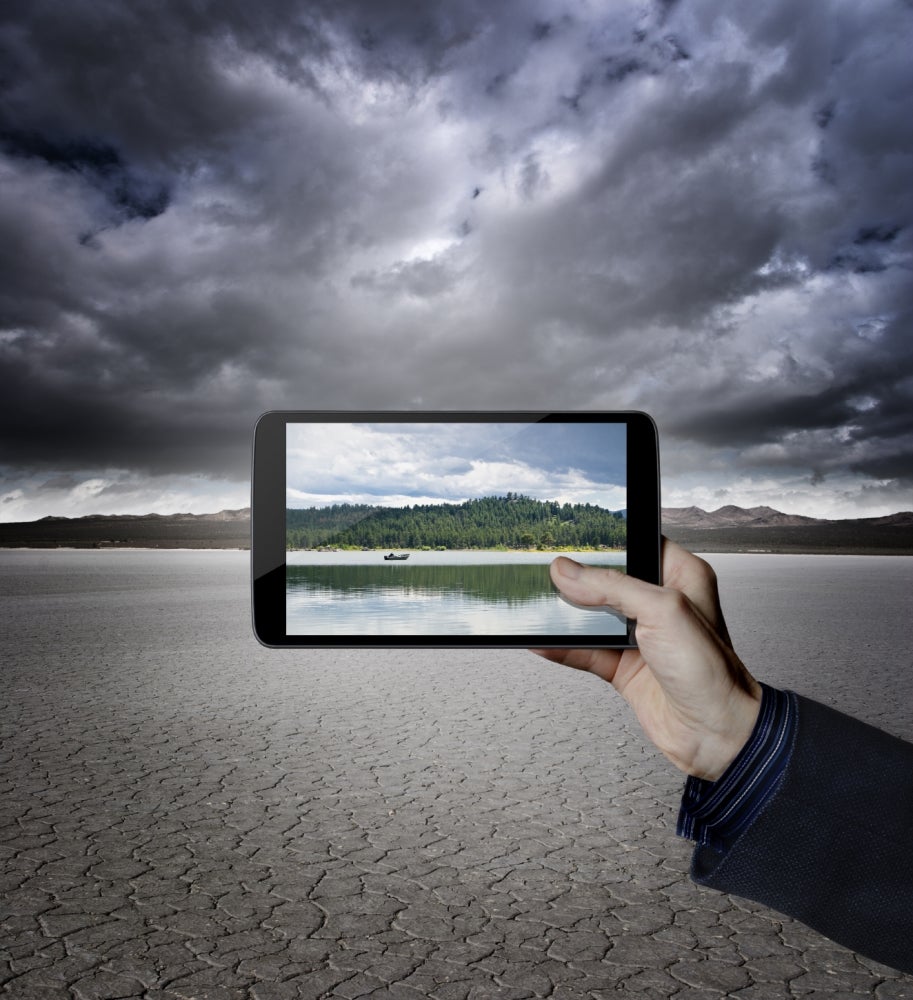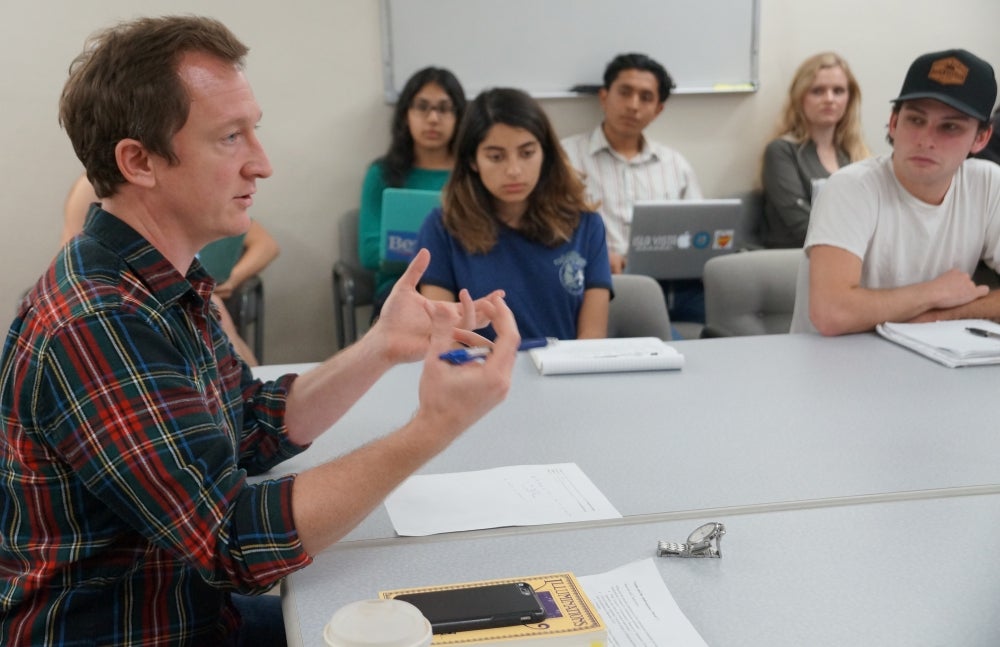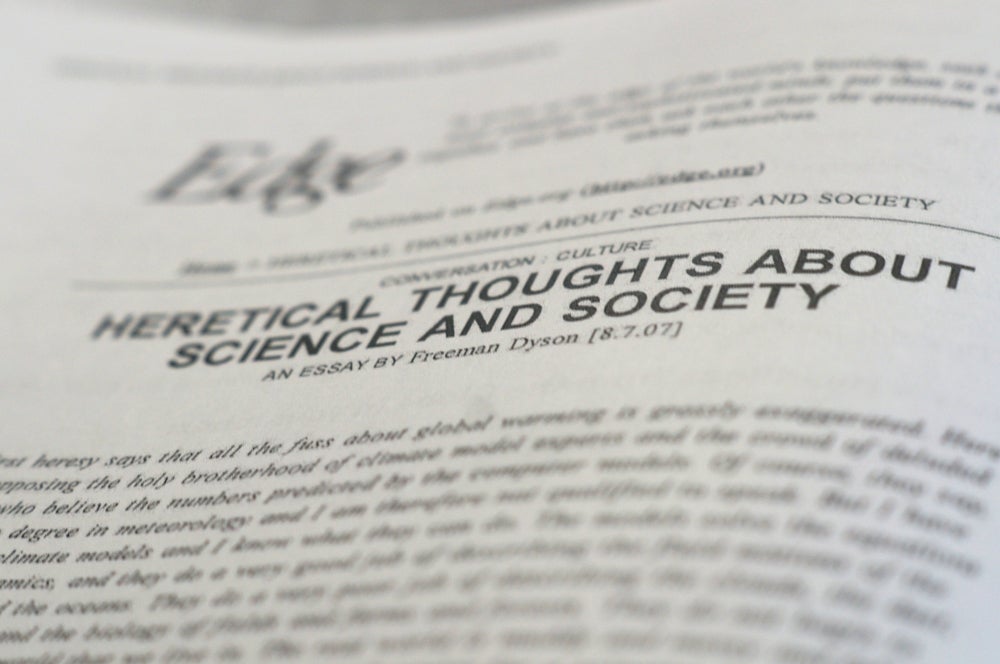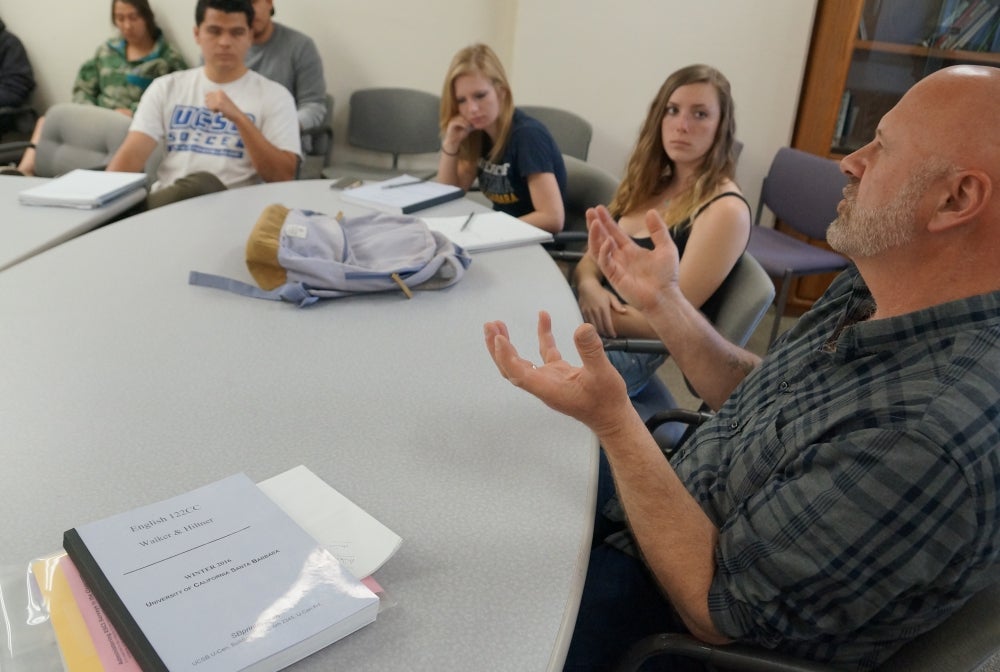Case Closed? Depends on Who You Ask
In a unique offering believed to be the first and only university course of its kind, UC Santa Barbara English scholar Ken Hiltner has created and launched a class examining climate change through the lens of literature.
“The Rhetoric of Climate Change,” which just wrapped its inaugural quarter, studies the climate change debate — Is it real? Is it manmade? Can it be fixed? Should it be? — by analyzing popular narratives on all sides of the argument.
“For the most part, scientists assume that the case is closed on this issue, but what fascinates me is that the case isn’t at all closed with respect to the public,” said Hiltner, a professor of English and of environmental studies. “There is still a great deal of denial literature being generated — narratives that are very convincing, that raise doubt. I thought it would be interesting to use the tools we have developed for literary analysis to approach it and see what we could learn.”
Take Shakespeare’s use of narrative in “Othello” to simultaneously enamor readers with Desdemona and seed disdain for Iago. The writers of so-called climate change “denial literature,” according to Hiltner, employ similar strategies with similar success.
“Going into this, I assumed most denial literature would be simplistic, preaching to the choir, but it is more complicated than that,” said Hiltner, executive director of UCSB’s Environmental Humanities Initiative (EHI). “They may offer counter arguments — it’s sunspot activity, it’s cyclical, happening every 1,500 years, it’s not human caused. Others acknowledge that the climate is changing and that it is human caused but question our ability to intervene, ‘How can we possibly stop it? What would the cost be to do it?’
“The arguments out there are so varied that they sometimes become close to a standard non-denial argument, turning on the question of ‘What do we do as a culture?’” Hiltner continued. “Do we change our lives, throttle back, not drive cars and so forth, or do we not do anything and wait for science to take care of it?’”
‘A Human Issue’
Co-teaching the new class is graduate student Christopher Walker, a Ph.D. candidate in English and current EHI research fellow who shares Hiltner’s passion for environmental humanities. (Walker himself is launching a new course this spring that will study the emerging literary genre known as “Cli-Fi,” or climate fiction.)
“One thing that was fascinating to see unfold among the students is that some of the denial literature is quite effective even with a very educated audience, an audience that is perhaps predisposed to seeing climate change as real,” Walker said. “And what was very valuable for students and, quite frankly, for me, is that by learning how denial literature might be effective we come to better understand how the humanities can really get to the core of the cultural distinction between those that understand climate change is happening and those who aren’t yet on board.”
Of the 25 students in this inaugural seminar, most, Walker and Hiltner concurred, were definitely on board with the idea that climate change is real and anthropogenic. Yet they also were decidedly enthusiastic about the opportunity not only to read opposing views, but to analyze and understand them. Across the board, students from the class attested to the importance of accepting diverse beliefs as a way toward solutions.
“It’s fascinating to look at climate change in the context of humanities, because in reality it is a very human issue,” said third-year English major Jessica Russo. “The idea of addressing any type of issue in the way you’d address ideas about literature — taking that humanities focus and applying it — is really valuable. For so many issues related to the environment, society and culture, we engage in debates without really reading and analyzing what our opponents are saying. I believe there would be much greater progression in those arguments if we would do more of what we did in this course.”
What they did was the critical examination that is at the heart of the humanities, by way of good, old-fashioned reading and writing. Hiltner and Walker identified the most prominent “denialists,” as such folks are colloquially known — S. Fred Singer, for example — and asked the students to read their most popular pieces. They tossed in key voices from the other side of the spectrum as well, such as author/activist Naomi Klein. Their framing document for it all: The latest comprehensive climate-change assessment report from the Intergovernmental Panel on Climate Change (IPCC).
“I don’t know anyone who wants to sit down and read the IPCC report, but it is important to do so,” said Hiltner, who was UCSB’s 2014-15 Sustainability Champion. “If nothing else, you walk out of this class seeing the many sides of what I would argue is one of the most important issues — if not the most important issue — of this century.
‘A Place for the Humanities’
“Not only are the climate change deniers a varied group, but the folks who want to do something about it are also of different minds as to what we should do and how we should do it,” Hiltner added. “At the end of the day, we wanted our students to realize how complicated this issue is — to sit down and take it apart. I think there is a real place in English, in the humanities, for tackling current, topical, important issues today, and this is certainly one of them.”
His belief in the powerful role that the humanities can play in addressing such global concerns was enthusiastically affirmed, Hiltner said, by the course and by the engaged, enthusiastic response from students. At a time when, according to a national study recently published in the journal Science, one in three U.S. public school educators is teaching climate-change denial, it’s coming none too soon.
“I went into this, our first official EHI course, thinking of it as an experiment, but it has both confirmed for me that we need to do more of this, as it answered a larger question that’s been asked a lot lately, ‘What are the humanities good for?’” Hiltner said. “The humanities need to be in the picture. Scientists are often surprised to find that this is a debate at all, but reading these texts we realize that this great battle is underway for American opinion, and it’s happening with words, it’s happening with our stock and trade. The science of climate change is being debated through competing narratives.”
Student Edward Friedlander, a graduating senior who will earn a bachelor’s degree in English, put it this way: “You can have climate research and science pertaining to climate change, but it’s useless if you can’t enter into dialogue with people who don’t accept that science. What this class does, uniquely, is allow us to investigate modes by which we can both infiltrate that discussion and help carry it out.
“We all have that uncle at family gatherings who is very adamant and determined pertaining to views about climate change,” Friedlander added. “This class gives you the tools to confront that uncle.”







